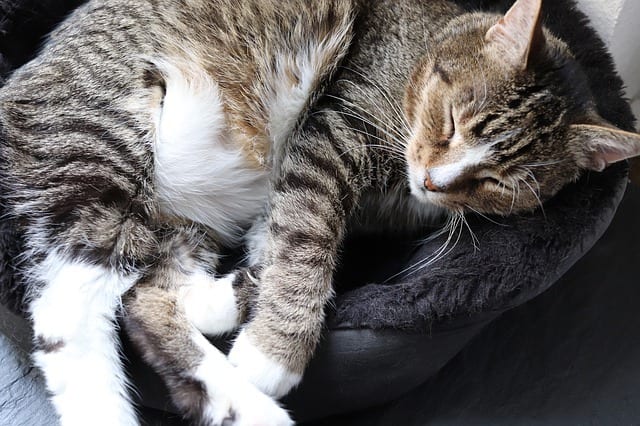You might be surprised by the wide spectrum of emotions your cat is capable of feeling. You know they feel things like comfort and even anger when you’re two minutes late to fill up their food bowl. Your unique bond is also proof they feel things like love and friendship. But amidst all those positive feelings, cats can also feel sadness, loneliness, and depression.
Depression in cats is a very real condition that’s recognized by veterinary professionals. Unfortunately, it’s often overlooked and misdiagnosed. When a cat is depressed, their overall quality of life suffers, and so can their physical health. It’s important for all cat owners to recognize the following signs of depression in cats.
Loss of Appetite
For a happy cat, meal time is one of the best parts of the day. When a cat is depressed, however, they might lose interest in foods they used to enjoy. It might take them longer to eat a full meal than it used to, or they’ll eat only enough to survive. You might also notice that they’re getting skinnier and skinnier. Even treats won’t spike their interest. A lot of cats are picky eaters on a normal basis, so refusing a certain type of food doesn’t automatically mean they’re depressed, but it’s something to be wary of.

Sleeping More
Cats already sleep up to 18 hours a day, but a depressed cat will start to sleep even more than normal. The best way to tell if your cat is spending an excessive amount of time asleep is to already be aware of their normal routine. If you pay attention and observe your cat’s behavior when you know they’re healthy and happy, you’ll have a better chance at knowing when something isn’t quite right.
Hiding
Not every cat wants to spend every second around humans, but you should know whether your cat is hiding more than usual or not. If a cat is depressed, they might go from being a social butterfly to a hard-to-find recluse. They might spend the majority of their time under the bed or tucked into the closet where they hope no one will find them.
Being Extra Clingy
Instead of hiding, some cats express their emotional distress by becoming more clingy than usual. This sign of depression in cats is often overlooked simply because their humans are happy to oblige and offer extra attention. Being extremely clingy (especially when it’s a new behavior), however, should be just as concerning as purposeful isolation.

Changes in Grooming
When a cat is depressed, normal behaviors, like grooming, can fall by the wayside. Their motivation to keep themselves clean and healthy disappears, and you’ll see their fur start to get greasy and matted. You’ll notice changes in long haired cats first, but short haired cats will also start to look messy and unkempt. A lack of grooming could also be a sign of arthritis, so it’s a behavior change that shouldn’t be taken lightly.
Irritability
We all know cats can be moody, but extreme regular irritability is often a sign of depression. When your cat is depressed, they don’t have the energy or patience to interact with others. Instead of their usual head bunts and purrs, their reactions might start to feel more aggressive. They might be quicker to swat, hiss, or bite when something bothers them. An unusually short fuse could mean your cat is suffering emotionally.

Lack of Interest
If you’ve lived with your cat for at least a few months, you should know all about their favorite activities. Maybe they love playing with catnip mice or chasing the dog’s tail. They might greet you with a leg rub every time you come home or choose to lay on your lap while you watch TV. If any of those things change, it could be because your cat is depressed. Depression can cause a cat to feel listless and uninterested in everything they used to enjoy.
What Can You Do?
If you believe your cat is depressed, the best thing you can do is uncover the reason behind their feelings. Sometimes the introduction of a new family member can cause an extreme emotional reaction, or your cat could be feeling bored or lonely. Addressing the issue directly will give your cat the best chance of naturally overcoming their depression.
Try setting up a predictable routine that includes time for one-on-one interaction with your cat. Stick to the routine and let them know they are safe and wanted. It’s also important to speak with a vet about your concerns. In some cases, medication can be used to better balance a cat’s mood. Helping your cat feel better might not happen overnight, but recognizing the signs your cat is depressed is the first step in the right direction.



